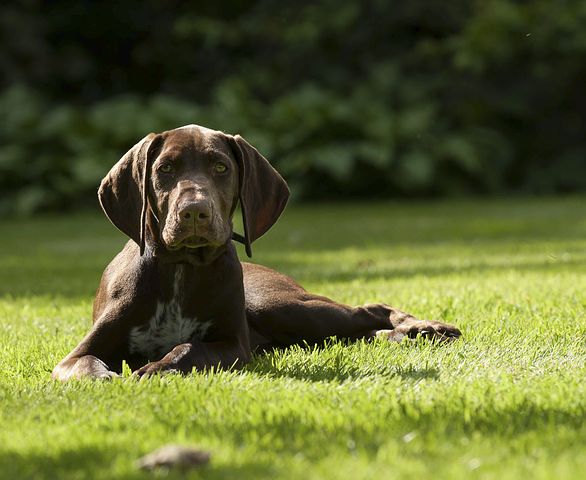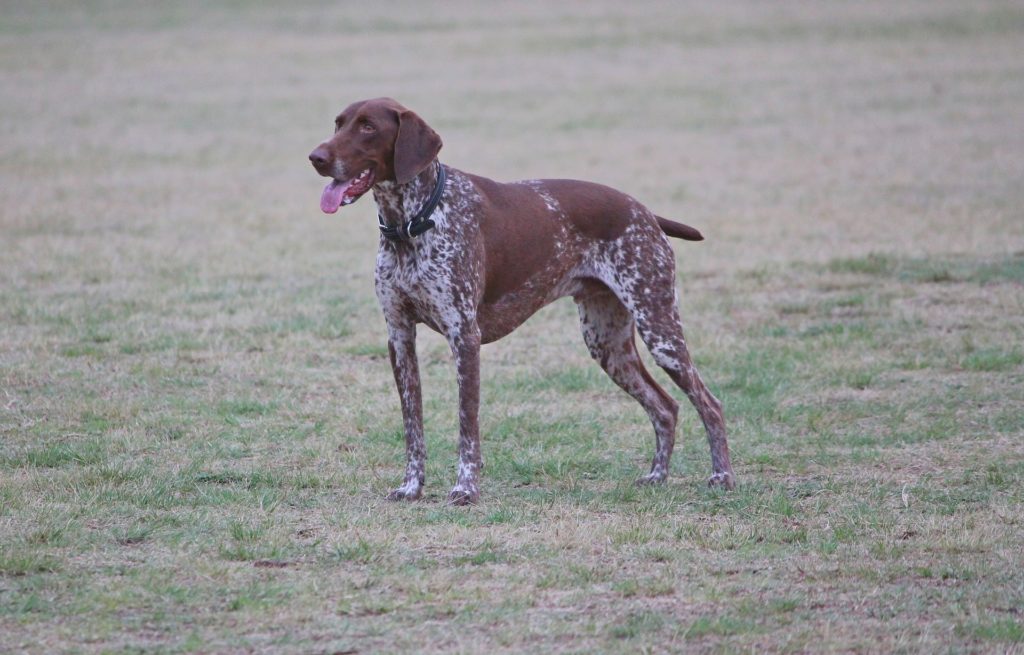Are you thinking about bringing home a German Shorthaired Pointer? Before you make a decision, find out more about the breed including how long this breeds lifespan is and how you can take proper care of your pup!
History & Physical Attributes
German Shorthaired Pointers were developed in Germany in the late 1800s and were originally called Deutsch Kurzhaars. The dog was first bred by crossing a Spanish Pointer with a Hannover Hound. The result was a versatile hunting dog that is instinctively skilled at trailing birds and forest animals. In addition to hunting, the breed was created for the intent of being a family companion. German Shorthaired Pointers came to the United States in the 1920s and were recognized by the American Kennel Club (AKC) in 1930.
As hunters and show dogs, German Shorthaired Pointers are considered to be symmetrical, sturdy animals with great agility and endurance. This breed is slightly smaller than Pointers and has drooped ears, dark eyes, and large noses. German Shorthaired Pointers have thick sleek coats and docked tails. Additionally, they have small webbed feet, which makes them great swimmers. Males typically weigh between 55 and 70 pounds, while females range from 45 to 60 pounds.
German Shorthaired Pointer Lifespan & Health
The average lifespan of German Shorthaired Pointers is between 12 and 14 years.
Compared to other dogs, the breed is cognitively slow to mature. A German Shorthaired Pointer is not considered to have the intelligence of an adult dog until they are two years old. If you’re considering adopting, keep in mind that you will have a fully grown dog with the mind of a puppy for at least a year. Despite their long lifespan, German Shorthaired Pointers are also prone to certain health conditions including:
- Central diabetes insipidus
- Hyperthyroidism
- Cleft palate
- Canine Gastric Dilatation-Volvulus
- Canine Heart disease
- Blood-clotting
- Entropion in dogs
- Nasal cavity tumors
- Canine Epilepsy
- Cranial cruciate ligament rupture
- Lymphedema
- Von Willebrand disease in dogs
Less common conditions include progressive retinal atrophy, hip and elbow dysplasia, ectropion, emergency gastrointestinal syndrome (bloat), and canine cardiomyopathy.
Preventing German Shorthaired Pointer Health Problems
Some of the health conditions common for the German Shorthaired Pointer are inherited. Because of this, some breeders will test their breeding stock for common diseases and get X-rays done in order to certify the condition of the dogs. If both parents of a German Shorthaired Pointer have certificates showing that they are cleared for heart disease, eye disease, cardiac problems, and hip and elbow dysplasia, the puppy will have a lower risk of developing those conditions later in life.
How to Improve the Lifespan of Your German Shorthaired Pointer
German Shorthaired Pointers thrive with an active lifestyle. They are highly intelligent and even-tempered, making them a perfect watchdog and loyal family member. Aside from working with a breeder to pre-screen your dog for common health conditions, there are a few things owners can do to help your pet live a long life.
Nutrition
Proper nutrition and high-quality dog food will help improve your German Shorthaired Pointer’s lifespan. The breed is medium in size and will require a breed-specific formula that caters to their current age and size. Most German Shorthaired Pointers will benefit from eating 2 to 3 cups of nutritious dog food per day, divided into two meals. You may want to work with a breeder or veterinarian to figure out the best frequency of meals for improving your dog’s longevity. Additionally, fresh water should be available at all times for your pet.
Grooming

Grooming and bathing your German Shorthaired Pointer on a regular basis will not only make him look and feel good, but it will contribute to his overall wellbeing. Giving your dog a bath can also be a great time to bond with him, which in turn, promotes vitality.
The nails on German Shorthaired Pointers grow very quickly and will need to be trimmed on a regular basis in order to avoid splitting, cracking, and overgrowth.
In addition, it’s a good idea to check his ears for wax and debris buildup which can cause infections. A German Shorthaired Pointer’s teeth should also be brushed regularly.
Physical Activity
German Shorthaired Pointers require lots of daily physical activity and thrive in active families. This breed loves to run, swim, hike, and play at the park.
The breed has boundless energy and enjoys being outdoors on a regular basis. By providing your German Shorthaired Pointer with daily opportunities to release his energy, you will help him live a happy, healthy, life.
As with all breeds of dogs, German Shorthaired Pointers are subject to a number of health issues. While some dogs may have to live with a health condition, most Pointers are generally healthy pets. If you take care of your German Shorthaired Pointer by exercising him, feeding him high-quality food, grooming him regularly and taking him to the vet for checkups, he will be able to live his longest, best life possible.





